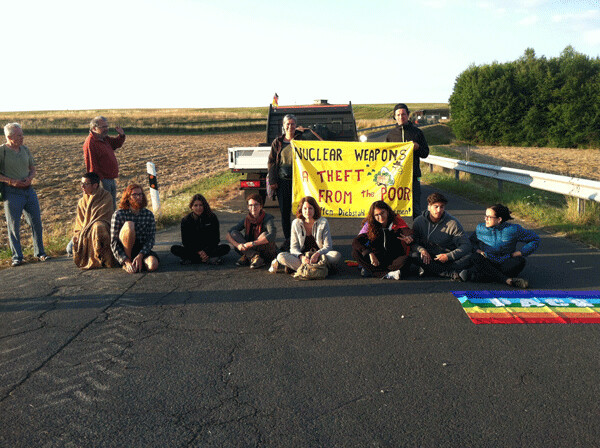News & Articles
Browse all content by date.

HAMBURG, Germany - I was with Gerd Büntzly, 69, of Herford, in a demonstration in Germany July 17, 2017. So were Steve Baggarly, Susan Crane, and Bonnie Urfer, all of the United States. Ours was a peaceful if covert, night-time occupation of a protected aircraft shelter or bomb bunker far inside the Büchel Air Force Base, near the beautiful Mosel River valley.
We were there to help prevent the unlawful use of the shelter in nuclear attacks or nuclear war preparations. Routine nuclear war planning by US and German Air Force personnel there, using US B61 nuclear bombs (NATO’s so-called “nuclear sharing”), violates the Treaty on the Nonproliferation of Nuclear Weapons (NPT) and several other international treaties, all binding on the United States and Germany.
In spite of our formal complaint to state prosecutors against “selective prosecution” of Gerd, and the violation of his “equal protection” rights, only he was charged, tried, and convicted of trespass and property damage (for clipping fences) in January last year. This Jan. 16, he was in court again appealing the conviction. Susan Crane from California and I travelled to Koblenz to speak on his behalf. Attorneys were quite sure that we two could testify, but ultimately were not allowed.
We wanted to explain that international law has the force of state and federal law in Germany and the United States, a fact recognized by Germany’s Constitution (Art. 25) and the US Constitution (Art. 6). According to Univ. of Illinois Law School Prof. Francis Boyle, writing recently for other nuclear weapons resisters, “International law is not ‘higher’ or separate law; it is part and parcel of the structure of federal law. The Supreme Court so held in the landmark decision in The Paquete Habana (1900), that was recently reaffirmed in Hamdan v. Rumsfeld, in 2006.”
Contrary to modern military strategists, there is no such thing as a “limited nuclear war.” Nuclear weapons only produce massacres. Beginning with 8 to 10 million degrees at detonation, followed by indiscriminate mass destruction from blast effects, city-size mass fires (firestorms) in which nothing survives, and uncontrollable radiation poisoning that produces genetic damage unlimited by space or time, nuclear weapons are just massacre delivery systems.
International law has prohibited the planning and not just the commission of such massacres since 1946.
Professor Boyle wrote last November 1st: “The Judgment of the Nuremberg International Military Tribunal meted out severe punishment in 1946 against individuals who, acting in full compliance with domestic law but in disregard of the limitations of international law, had committed war crimes and crimes against peace as defined in its Charter.”
The Nuremberg Charter and Principles apply to individual civilians like us and oblige individuals to disobey domestic laws that protect government crimes. And Nuremberg prohibits all “planning and preparation” of wars that violate international treaties.
The 1949 Geneva Conventions prohibit indiscriminate attacks on noncombatants, attacks on neutral states, and long-term damage to the environment.
The 1907 Hague Conventions forbid the use of poison and poisoned weapons under any circumstances.
Under the 1970 NPT, it is prohibited for Germany to receive nuclear weapons from the United States and for the US to transfer them to Germany. Germany and the United States are both formal state parties to all of these Treaties.
“By implication,” Boyle explains, “the Nuremberg Judgment privileges all citizens of nations engaged in war crimes to act in a measured but effective way to prevent the continuing commission of those crimes. The same Nuremberg Privilege is recognized in Article 38 of the Statute of the International Court of Justice which has been adopted as a Treaty (the United Nations Charter) by the United States” [and Germany]. In my opinion, such action certainly includes nonviolent exposure and inspection of sites of ongoing war crimes.”
Because nuclear weapons cannot be used without violating these binding international treaties; since Germany and United States at Büchel are planning and preparing war that violates these treaties; and because the Nuremberg Charter and Principles forbid this planning and preparation, and apply to civilians and military personnel alike, and hold citizens individually responsible; and require citizens to disobey illegal orders, to refuse participation in or ignore international crimes, civil resistance at Büchel is no offense but a civic duty, a lawful obligation, and an act of crime prevention.
In Gerd’s appeal, the three-person “bench” (two lay volunteers and one criminal court judge) found him guilty after making a few standard quips about “deterrence.” Prescient as ever, Professor Boyle’s latest book is, “The Criminality of Deterrence.”
| Tweet |

